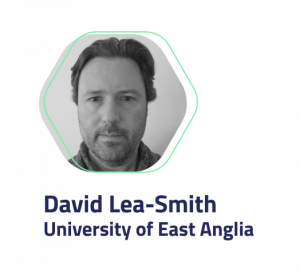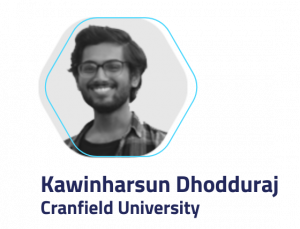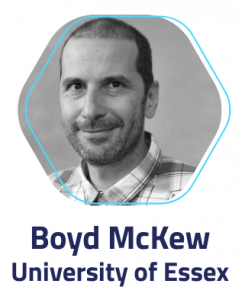
Join our biotechnology webinar series to see how EBIC applies engineering biology to address pressing environmental challenges. Bringing together leading experts to explore real-world solutions for a healthier planet – don’t miss your chance to be part of the conversation driving environmental change!
Episode 1 - Microbial Engineering: Tools & Genetic Modification Techniques
Webinar 1 - Microbial Engineering: Toolsets & Genetic Engineering Methods
November 14 2025 13:30 - 14:30 (GMT)
Our first session - Microbial Engineering: Tools & Genetic Modification Techniques - features our EBIC experts Dr. David Lea-Smith, Associate Professor of Microbiology at the University of East Anglia, and Kawinharsun Dhodduraj, Researcher at Cranfield University.
With them, we review cutting-edge tools and tactics for microbial genetic modification, including practical insights and real-world examples. The webinar is also an opportunity for attendees to explore broader applications and significance of microbial engineering from a researcher’s perspective, and to engage directly with our experts via our live chat.
Join us as we explore the latest tools, techniques, and insights driving innovation in engineering biology.
Our Speakers
- Dr Lea‑Smith leads cutting‑edge work developing synthetic biology toolsets and genetic engineering methods for a wide range of bacteria, including cyanobacteria, applied to carbon capture, compound production and biotechnological innovation.
- He has pioneered systems such as modular Golden Gate cloning in cyanobacteria, and engineered bacteria for bioremediation and synthetic production.
- This webinar offers the chance to hear from a practitioner at the interface of microbial cell biology, engineering and biotechnology—bringing tools and methods to life.
- Kawinharsun Dhodduraj interest lies within using Metabolic Engineering tools for enhancing the production of platform chemicals.
- His current research work focuses on the production of 2,3-butanediol using various organic waste streams rich in fermentable sugars. This involves developing optimal pretreatment strategies, optimizing the production pathway through metabolic engineering and process intensification. His research emphasizes utilizing renewable carbon sources and developing low-carbon manufacturing technologies, aligning with multiple United Nations Sustainable Development Goals.
- Kawinharsun will also focus on the applications & impact of microbial engineering in his research field.
Missed the livestream? Watch the recording now:
Episode 2 - Biosurfactants for Oil Spill Response
Webinar 2 - Biosurfactants for Oil Spill Response
March 16, 2026 12:00 - 13:00 (GMT) - Register Now
Our second webinar - Biosurfactants for Oil Spill Response - features our EBIC experts Tony Gutierrez, Associate Professor of Environmental Microbiology and Biotechnology in the School of Engineering and Physical Sciences at Heriot-Watt University and Dr Boyd McKew, Senior Lecturer in Environmental Microbiology at the University of Essex.
Our Speakers
- Specialising in the bacterial biodegradation and bioremediation of crude oil and hydrocarbons - using transcriptomics and proteomics to identify genes and proteins involved in hydrocarbon degradation and biosurfactant production, in a range of environmentally relevant bacteria, with the goal of enhancing these pathways for bioremediation.
- Dr McKew also specialises in utilising synthetic biology to design and construct new biological devices and systems for enhanced bioremediation of marine oil pollution.
- Within EBIC Boyd is involved in our Cluster 2 activities, providing target genes to be used in parts of the research undertaken under Theme 2 focusing on environmental bioremediation.
- Leads research in the field of Environmental Microbial Ecology and Microbial Biotechnology, with a focus to uncover the diversity and function of bacteria involved in the removal of anthropogenic pollutants (plastics, petrochemicals and other chemicals)
- Prof. Gutierrez’s work has led to the discovery of 3 novel cultivable bacterial species that use petrochemical pollutants as their sole source of food. Using a sophisticated molecular biology tool called DNA-based stable isotope probing (DNA-SIP), his lab has uncovered many other bacterial species that break down petrochemicals and plastic polymers. Another major focus of his work is on discovering new types of microbial bio-surfactants.
- Within EBIC Tony's role is to develop sustainable microbial bio-surfactants, and recombinant systems to produce these biomolecules, for applications to enhance the natural attenuation and bioremediation of environmental sites contaminated with toxic chemical pollutants. (Theme 2).






